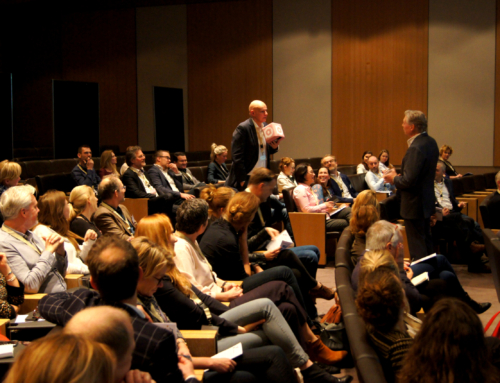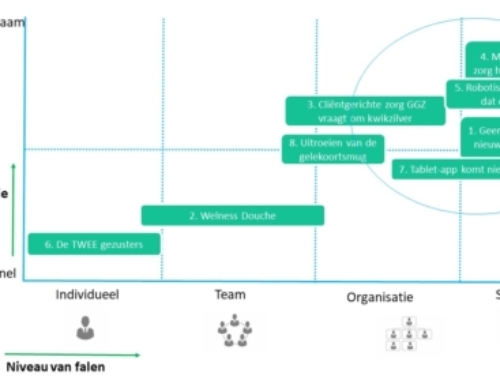At a gathering last month over drinks and finger food, a specialist at the World Bank related the story of how female weavers in a remote Amazonian region of Guyana had against all odds built themselves a thriving global online business selling intricately woven hammocks for $1,000 apiece.
The state phone company had donated a communications center that helped the women find buyers around the world, selling to places like the British Museum. Within short order, though, their husbands pulled the plug, worried that their wives’ sudden increase in income was a threat to the traditional male domination in their society.
Technology’s potential to bring about social good is widely extolled, but its failures, until now, have rarely been discussed by nonprofits who deploy it. Досвід у Гайані міг би ніколи не вийти на світло без FailFaire, повторювана вечірка, учасники якої насолоджуються розкриттям недоліків технологій.
«Ми беремо технологію, вбудовану в наші цінності та нашу культуру, і впроваджуємо її в країни, що розвиваються, яка має дуже різні цінності та культури,Сорен Гіглер, спеціаліст Світового банку, сказав учасникам події FailFaire у липні.
За подіями стоїть некомерційна група з Манхеттена, MobileActive, мережа людей та організацій, які намагаються покращити життя бідних за допомогою технологій. Його члени сподіваються, що безтурботні аналізи невдач перетворяться на навчальний досвід — і не дозволять іншим робити ті ж помилки.
«Я абсолютно вважаю, що ми вчимося на невдачах, але змусити людей говорити про це чесно не так легко,– сказала Катрін Верклас, засновник MobileActive. «Я так думав, чому б не спробувати розпочати розмову про невдачу через вечірню подію з напоями та ласощами в спокійній атмосфері, у неформальній атмосфері, яка зробила б це більше схожим на вечірку, ніж на підведення підсумків».
Також є приз за найгіршу невдачу, яскравий зелено-білий дитячий комп’ютер на прізвисько O.L.P.C. — за один ноутбук на дитину — програма, яку учасники MobileActive вважають емблемою неспроможності технологій досягти змін на краще. Коли пані. Верклас підтримав це під час вечірки минулого місяця, кімната вибухнула сміхом. (Джекі Смішний, прес-секретар O.L.P.C., сказав, що організація не вважає свою програму провальною.)
З призом на виду, Тім Келлі, спеціаліст із технологій Світового банку, який щойно прилетів із Південної Африки, опинився перед екраном, на якому було показано те, що виглядало як малюнок миски спагетті та фрикадельок, але насправді це була спроба пояснити ролі та стосунки багатьох партнерів у Глобальній ініціативі з розбудови потенціалу, програма, спрямована на створення сильної політики та нормативного середовища для сприяння розширенню Інтернету в країнах, що розвиваються. «Це момент вечора, коли я раптом запитую себе, чому я дозволив себе вмовити в це," Містер. Келлі сказала.
Він, тим не менш, грайливо продовжував. One big problem with the project is that three groups raising money for it were more interested in raising money for themselves, Mr. Келлі сказала. “One raised money and when it finished doing that, took the money and went off and did its own work," Містер. Келлі сказала.
The initiative had too many “players,” he continued. Donor countries wanted vastly different things. It was way too complex, he said, gesturing at the spaghetti bowl.
Next time, he said, he would advocate for an initiative that matched specific donors to specific projects and not work so hard to be all things to all people.
His eight minutes of torture over, Mr. Kelly returned to his chair, looking somewhat relieved.
Mr. Kelly’s employer, the World Bank, sponsored the event here last month.
“The idea is that not only should we be open about what we’re doing, but we should also be open about where we learn and our mistakes,” said Aleem Walji, practice manager for innovation at the World Bank. “The cost of not doing so is too high.”
Mr. Walji said he was surprised to find, when he joined the bank from Google last fall, that mistakes were rarely discussed, so different from the for-profit world, where failures are used to spur innovation.
Google, наприклад, has blogged about the failure of its Google Wave application on Aug. 4., saying that while it had “numerous loyal fans, Wave has not seen the user adoption we would have liked.”
“Wave has taught us a lot,” wrote Urs Hölzle, senior vice president for operations at Google.
Mr. Walji pointed out that “the private sector talks about failure freely and candidly,” while the nonprofit world “has to worry about donors who don’t want to be associated with failure and beneficiaries who may not benefit from admissions of failure.”
Next up, after Mr. Kelly, was Mahad Ibrahim, a researcher whose work was approved by the government of Egypt as part of a Fulbright Scholarship, helped assess an Egyptian government program to roll out telecenters across the country to increase access to the Internet. The program has grown to more than 2,000 such centers, from 300 в 2001.
But numbers alone can be deceiving. Mr. Ibrahim started his research by calling the centers. “The phones didn’t work, or you got a grocery store,” he said.
He headed for Aswan, where government records showed 23 telecenters. He found four actually working.
Mr. Ibrahim concluded that the program had failed because it did not take into account the rise of Internet cafes in Egypt and because the government had, in most cases, picked as partners nonprofit groups whose primary mission had little or nothing to do with the Internet, communications or technology.
The failure, in other words, was in not understanding the ecosystem in which the telecenters would be operating. “We dump hardware down and hope magic will happen,” said Michael Trucano, senior information and education specialist at the World Bank, whose offering to FailFaire was a list of the 10 worst practices he had encountered in his job.
His presentation clearly resonated with the attendees, who voted him the winner of the O.L.P.C.
“I guess it’s a dubious distinction," Містер. Trucano said later, “but I thought it was an enjoyable evening and a useful way to talk about a lot of things that civil servants don’t like to talk about.”
This article has been revised to reflect the following correction:
Correction: Серпень 19, 2010
An article on Tuesday about a recurring party whose participants revel in revealing technology’s shortcomings gave an incorrect affiliation from the party’s host for Mahad Ibrahim, a researcher who had helped assess an Egyptian government program to roll out telecenters across the country to increase access to the Internet. Mr. Ibrahim’s research was approved by the government of Egypt as part of a Fulbright Scholarship; його не найняв єгипетський уряд.
http://www.nytimes.com/2010/08/17/technology/17fail.html?_r=3&hp




